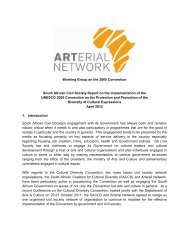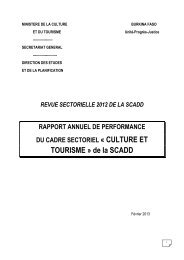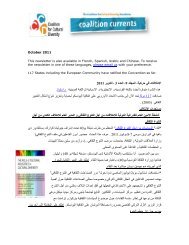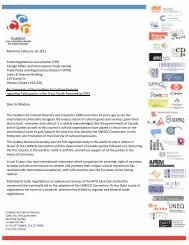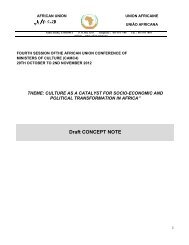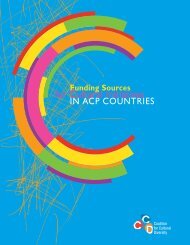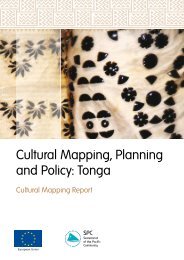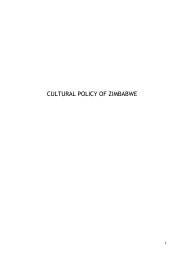Funding Sources for Cultural Initiatives in ACP Countries
Funding Sources for Cultural Initiatives in ACP Countries
Funding Sources for Cultural Initiatives in ACP Countries
- No tags were found...
You also want an ePaper? Increase the reach of your titles
YUMPU automatically turns print PDFs into web optimized ePapers that Google loves.
PRIVATE FUNDSAga Khan FoundationMa<strong>in</strong> officeAga Khan Foundation (Mozambique)Edificio Sua Alteza Aga KhanAv. Albert Luthuli 739P.O. Box 746MaputoMozambiqueWebsitehttp://www.akdn.org/default.aspImportant noteAga Khan Foundation is largely an implement<strong>in</strong>g organisation rather than a grant-mak<strong>in</strong>g foundation.It works <strong>in</strong> rural development, education, health, environment and civil society, and funds a fewprojects that further its development goals.Please note that a precondition <strong>for</strong> fund<strong>in</strong>g is the existence of the Foundation office <strong>in</strong> the countrywhere the proposal orig<strong>in</strong>ates or where the project would be executed.Purpose and program areasThe Aga Khan Trust <strong>for</strong> Culture (AKTC) focuses on the physical, social, cultural and economicrevitalisation of communities <strong>in</strong> the Muslim world. It <strong>in</strong>cludes:The Aga Khan Award <strong>for</strong> ArchitectureThe Aga Khan Historic Cities ProgrammeThe Aga Khan Music Initiative <strong>in</strong> Central AsiaThe on-l<strong>in</strong>e resource ArchNet.orgThe Aga Khan Program <strong>for</strong> Islamic Architecture at Harvard University and the MassachusettsInstitute of TechnologyThe Museums & Exhibitions unit coord<strong>in</strong>ates the development of a number of museum andexhibition projects<strong>Fund<strong>in</strong>g</strong> sourcesA significant portion of the fund<strong>in</strong>g <strong>for</strong> development activities comes from national governments,multilateral <strong>in</strong>stitutions and private sector partners (see: http://www.akdn.org /partners.asp).Eligible countriesThe AKDN works <strong>in</strong> 30 countries around the world, mostly <strong>in</strong> poor areas of South Asia and CentralAsia, Eastern and Western Africa, and the Middle East. Other programmes, notably <strong>in</strong> education andculture, operate <strong>in</strong> Europe and North America as well as <strong>in</strong> Asia and Africa.74



